- Home
- Peter Swanson
The Kind Worth Killing Page 25
The Kind Worth Killing Read online
Page 25
“This is pretty,” my mother said as I wound her Volvo toward Kennewick Cove. It was still light out, but the sun was low in the west, casting long shadows across the road. The sky was a deep electric blue.
I pulled into the parking lot of the Admiral’s Inn, where I’d left my car less than twenty-four hours earlier. It was still there. Before driving back to Winslow, my mother and I stretched our legs, walking down to the edge of the beach, looking out at the slate-colored ocean. “I always loved the ocean, but your father hated it.”
“Yes, he does,” I said, and laughed. “He said it was like looking at death.”
“‘It’s like looking at death and everyone saying how lovely it is,’” my mother said in an English accent, mimicking my father.
“Right. That’s what he always said. What was the other one? ‘I love the beach, everything except the fucking sand, the fucking sun, and the fucking water.’”
“Yes, I remember that. What he meant was that the only thing he liked about the beach was the girls in bathing suits.”
We laughed together, then my mother shivered from the cold, and we got back into our respective cars to drive to Winslow. I was tempted to drive north along Micmac Road a little ways to see if there was any activity at Ted and Miranda’s house but decided not to risk it. I would find out soon enough how long it took the police to discover Miranda’s body. I turned south instead, taking the fastest route to I-95. At a little before six, I pulled into the driveway in Winslow, my mother still behind me. There were no police officers waiting for me, no SWAT team emerging from the woods. I was home, and I had gotten away with it. A surge of elation went through me, a feeling similar to what I’d felt in the meadow fifteen hours earlier. I had changed the world, and no one would ever know it. And even if they found Brad’s truck in New York City, they would assume that he had simply left it there. They would never find him, and they would never connect me to any of this. Miranda would be found dead, all evidence pointing to Brad Daggett as the killer. And Brad would disappear forever. The police would assume he went on the run, but they would never find him. Case closed.
I remembered telling Ted that there were two ways to hide a body. One was literal, but the other way to hide a body was to hide the truth of it, to make it appear as though something else had happened to it. We did it, I whispered as I got out of the car, allowing myself a moment to believe that there was someone out there to share this with me. My mother followed me into my house. I flipped on the foyer light, and took her overnight bag from her.
“Oh, so quaint,” she said, as she always did when she came to my house.
CHAPTER 29
KIMBALL
By the time Detective James and I reached the Severson house in Kennewick, there was barely room to park our car along the driveway. It was already a jurisdictional mess, as we knew it would be. The entire Kennewick Police Department had turned out, but because of the limited resources of their detective department, the state police detectives had been called in as well. The chief medical examiner was there, and I heard that the U.S. Marshals Service had been advised that a possible murder suspect had most likely crossed state lines. We did manage to work our way into the house, getting past the miles of yellow police tape and about seven uniformed officers, all determined to protect the scene.
I’d seen the gigantic house from the outside the day before, when we’d been looking for Brad Daggett, but hadn’t been inside yet. The foyer was the size of my apartment. Miranda Severson was facedown on the unfinished floor. She wore an expensive-looking dark green coat over jeans and boots. One of her gloved hands was up near her destroyed head. Her hat—gray tweed with a short brim—had come off. Her black hair was loose, spilling around her head. It was hard to tell where the hair stopped, and where the blood, dark and congealed, began. Together, the hair and the blood formed a black halo around her head.
“Weapon?” I asked Chief Ireland, who had come up to stand next to me. He hadn’t said anything yet—he was giving me a chance to look at the body.
“It just got bagged. Twenty-four-inch adjustable wrench. Laid out right next to her.” He gestured vaguely toward one of the many portions of the dusty floor that had been marked with tape.
“What else they find?”
“Plenty, from the looks of it. Footprints, fibers, hairs. You missed the bagging party.”
“Anything unusual?” I asked.
“You mean more unusual than a girl with her head beat in?”
“I mean anything that doesn’t make it look like what it probably is. I mean, anything that doesn’t make it look like Brad Daggett panicked, brought her here, and beat her to death.”
“Well, no. We didn’t find the dropped wallet of the mayor of Kennewick, if that’s what you mean. There were some pretty fresh tire tracks out front that didn’t get run over by the dog and pony show. They looked like truck tracks to me, and they probably belong to Daggett’s F-150. So nothing really strange. I mean, if you ask me, it’s all strange. She put her hand up to block the blow”—Chief Ireland raised his own wide hand to the side of his head to demonstrate—“but that was all the fight she put up. So, yeah, that’s a little strange. He marches her in here holding a giant wrench and she just stands there and lets him beat on her head.”
“That is strange,” I agreed. “No sign of there being anyone else in here besides the two of them?”
“Well, they photographed everything, so we’ll wait and see, but just eyeballing it, I’d say no. What was odd was that it looked like she probably came in through the front door, and Daggett came in through the sliding glass doors—these ones right here. See those big prints? Those are his.”
There was tape marking everything, but I picked out the small muddy ridges on the otherwise dusty floor that must have come from Brad’s boots.
“Why would he do that?”
“I can think of some reasons. Not necessarily good ones. Maybe the front door was locked, so while she looked for the key he went around the back to see if those doors were open. Maybe he sent her into the house first, then went back, got his wrench, and came in the back door in order to sneak up on her and surprise her.”
“That makes sense, I guess,” I said.
“Maybe he wanted to look at the moonlight on the ocean.”
“You never know,” I said.
One of Ireland’s officers was waving him down from across the room. He excused himself and went over to him. I stood for a while longer, looking at the body, wondering about the footprints. James came over to me. She wore a gray London Fog trench coat over her black pantsuit. Stylish as always, except she wore a winter hat in Celtics green with the awful logo of the little Irish leprechaun spinning a basketball on his finger.
“What’d you find out?” I asked her.
“All signs point to Daggett. Time of death was probably twelve hours ago, which means he could be pretty far away.”
“He’ll get caught,” I said.
“Oh, yeah,” she said.
I told her about the footprints that came in from the front and from the back as well. She thought about it for a moment. “Makes sense. He brings her here to kill her but he can’t walk in with a big wrench in his hand. So he makes an excuse to return to the truck, gets the wrench, then runs around to the back of the house. Sliding doors were probably already unlocked. What makes less sense is how he talked her into coming to the house at all. I mean, if he told her he wanted to talk, they could’ve talked in the truck. It’s not like this place is warm and comfortable.”
“Yeah, I know. That bothers me, too.”
We stood for a moment quietly. Then I said, “Have you seen the view? Out the back.”
“No,” she said. Together, we walked toward the sliding glass doors that led to a stone patio, and through them out into the beautiful fall day. The view was stunning. The house was on a bluff directly over the Atlantic. You could see miles in all directions.
“Was that going to be a pool, you thi
nk?” James asked about the wide hole dug in the sloping back lawn.
“That’d be my guess,” I said.
“It’s all a little bit obscene. Not the location, but the size of the house. It looks more like a hotel than a place for a couple with no kids.”
I stepped out farther and turned back and looked up at the beige facade of the house. The second floor was lined with little balconies. One for every bedroom, I guessed. There was a built-in fireplace on the stone patio, and a place for a grill and a minifridge. I wondered what would happen to this place. If someone would swoop in and pay to have it finished, or if it would just languish and rot, become a luxury home for a colony of bats or raccoons.
“Another thing,” James said. She was still looking out at the ocean. “If our assumption is correct, if Miranda Severson talked Brad Daggett into killing her husband, he must have done it thinking he would come into all of this wealth eventually.”
“Maybe he was in love with her, James. Don’t be cynical.”
“Whatever. It doesn’t change my point, which is why does he kill Miranda less than a week after killing her husband? I mean, she’s the reason he’s doing all this. Killing her means it all goes away. No more money, no more sex.”
“Yeah, it’s strange. There could be lots of reasons, though. He panics, thinks Miranda is going to turn him in.”
“If that’s the case, then why not just run instead of killing her first and then running?”
“I don’t know,” I said. “Maybe he acted alone. Maybe he’d fallen in love with Miranda, thought that killing the husband would make her fall into his arms. When that didn’t immediately work, he killed Miranda so no one else could have her.”
“I thought of that,” James said, “but if that was the case, then how’d he get Miranda to agree to come here with him?”
“Well, we’ll find out. They’ll get him soon. Twenty-four hours, tops. In the meantime, we’ve got a case to build. I’m going to go talk with this Polly Greenier, Brad’s alibi for Friday night.”
“You need me?”
“I always need you,” I said. “But I can manage Polly. Something makes me think that as soon as I tell her we have a positive ID on Brad down in Boston her alibi will break.”
“Okay. Call if you need me. The state detectives want us to pass over all we have on the Ted Severson murder case, and I said I’d oblige.”
After getting the address from Chief Ireland, I drove north to Kennewick Beach, passing Cooley’s, the bar that Brad had supposedly been in with this Polly last Friday afternoon. From the beach road I turned inland onto Sea Mist Road, going about a mile, the houses getting smaller, the woods getting thicker. Polly Greenier lived down a dead-end street called York Court in a small single-story gray house situated on a yard that hadn’t been mowed all summer. I double-checked the number on the mailbox. The house, blinds pulled down in all the windows, looked unlived in.
I waded across the foot-high grass to the front door. The doorbell produced an echoey bong from within the house, and almost immediately, a blond woman with a phone tucked between her shoulder and her chin swung open the door. I had my badge out.
“Jan, I gotta go,” she said into the phone. She kicked the screen door open a half inch and gestured me in. “Yeah, yeah, I’ll call you back. I gotta go, the police are here.”
“What’s going on?” she said to me after I’d scraped my feet on the welcome mat and entered the messy living area.
“I’m here to ask you some questions about the last time you saw Brad Daggett. Would that be okay?”
“Oh God, yeah, of course,” she said. She still held the phone in her hand. In her other was an unlit cigarette. She wore a long pink nubby robe, hanging loose in the front, the side of one of her heavy breasts visible. I kept my eyes on her face. She invited me in, bunching up her robe in the hand that held the cigarette, then pointed me toward a living area that contained a matching couch and recliner. A cocker spaniel in a dog bed turned his wet eyes toward me. Polly excused herself for a moment and I sat down on the corduroy recliner. The house smelled of cigarettes and Febreze.
When Polly came back into the living room, she was still wearing the robe, but had knotted it tightly around herself. Her blond hair was pulled back, and it looked like she might have put a little bit of makeup on but I couldn’t be sure.
“Can I get you anything? Coffee?”
“If you’re having some, sure. If not, I’m fine.”
She went and got us both a cup of coffee, adding milk and sugar to mine without asking. While I waited I bent down and scratched the dog on the back of his head. He was old, I realized, his big eyes filmed with cataracts. “That’s Jack,” she said, when she handed me my coffee. I took a sip as Polly settled herself across from me on the couch. She crossed her legs and the robe fell away from her legs. She was heavy in the middle, her stomach bulging against the robe, but Polly Greenier had lovely legs, lightly tanned and beautifully shaped. Her toenails were painted an iridescent blue.
I had wondered before coming here if Polly would have heard yet about the body in the Severson house, but I now knew that she had. I could tell as soon as she’d opened the door, the phone against her ear. She’d probably been talking about it all morning.
“You’ve heard?” I said. “About the body that was found this morning?”
“Oh, yeah. It’s all over town. Is it really Miranda Severson?”
“She hasn’t been ID’d, but, yes, we believe it’s Miranda. But I’m here because of Brad Daggett.”
“I don’t know where he is. I swear to God. I told the police chief everything last night.”
“No, I know,” I said. “I didn’t come here because I thought you might know where he is. I came here because I wanted to hear more about the last time you saw him. I heard from Chief Ireland that it was last Friday night.”
“That’s right.”
“Can you tell me about it? I know you’ve been through it already, but I’d like to hear it as well.”
She told me how she and Brad had had an on-again, off-again romance since practically forever, all the way back to Kennewick High, and that they both still hung out at Cooley’s, and occasionally hooked up, and that the last time this happened was Friday. “I’m not proud of it, but we go way back, you know. Sometimes I thought we were destined to wind up together.”
“You sure it was Friday?”
“Oh, yeah,” she said, leaning forward and plucking her pack of Marlboro Menthols off the table. “You don’t mind if I smoke, do you?” she asked.
“No, of course not.”
“You want one?”
“Sure,” I said and leaned across to pull one of the cigarettes from the hard pack. I usually only smoked hand-rolled cigarettes, but I figured it couldn’t hurt to bond a little with Polly Greenier. She lit her cigarette first, then passed the Bic lighter over to me. I hadn’t had a menthol in years, and the first minty drag punched me in the throat. “How are you positive it was Friday?” I asked.
“It’s the only day of the week I get off work early. I do the five-to-one shift at Manor House Nursing Home on Friday. Afterward I went to Cooley’s for lunch and that’s where I saw Braggett . . . I mean, Brad . . . we had a few drinks, then went back to his place.”
“Did you plan on meeting him there, or was it just chance?”
“Half and half, really. I’d seen him earlier in the week, and he’d mentioned it to me. Asked me if I still got off early on Friday and told me that he was planning on being at Cooley’s, and maybe we could have a few drinks, celebrate the weekend.”
“Was that usual for the two of you. Making plans to meet?”
She blew a plume of blue smoke from her nostrils and rounded the ash of her cigarette against the edge of a glass ashtray on the coffee table. “No, not really. We didn’t usually make plans. We’d just run into each other. It’s a small town, you know.”
“Anything else unusual about that day, about Brad?”
&nbs
p; “He was a little strange, I’ll admit it. Like, he insisted on paying for my lunch and buying me beers. He was kind of all over me. I mean, that’s happened a lot in the past, but not usually in the middle of the day. I thought it was weird, but I also kind of liked it. I thought maybe he’d gotten lonely since his marriage broke up and decided he wanted a girlfriend.”
I finished my cigarette, put it out in the ashtray. “Polly, Brad Daggett was positively ID’d as being in Boston on Friday night around six at night. Are you sure you want to stick to your story?”
“I don’t understand. I was with him at his place.”

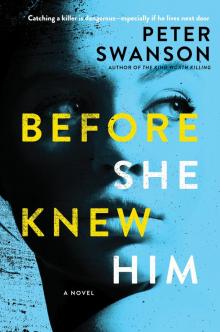 Before She Knew Him
Before She Knew Him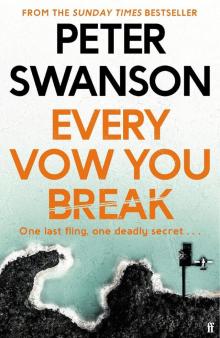 Every Vow You Break
Every Vow You Break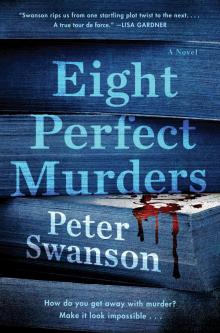 Eight Perfect Murders
Eight Perfect Murders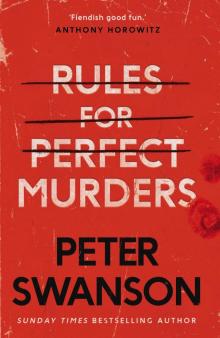 Rules for Perfect Murders
Rules for Perfect Murders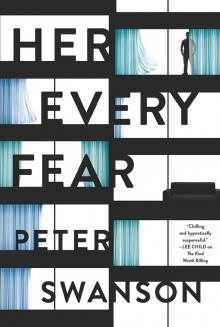 Her Every Fear
Her Every Fear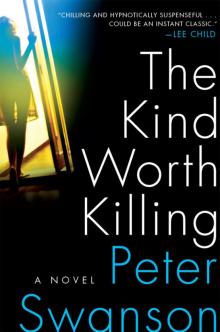 The Kind Worth Killing
The Kind Worth Killing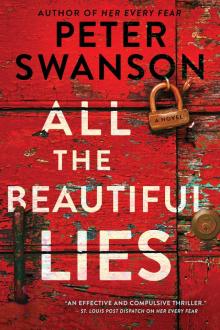 All the Beautiful Lies
All the Beautiful Lies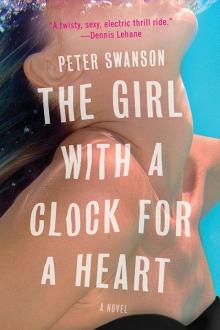 The Girl with a Clock for a Heart: A Novel
The Girl with a Clock for a Heart: A Novel